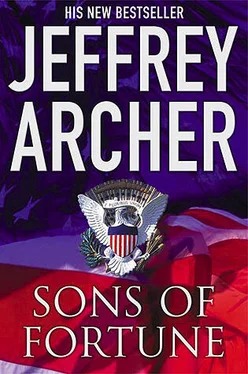Petrowski nodded.
Fletcher turned to Nat. ‘That last statement sounded to me as if it had been written in the DA’s office.’ He paused, looked down at his yellow pad and commented that ‘abrogation’, ‘essential points’, and ‘assailant’ were delivered as if they had been learnt by heart. ‘Petrowski won’t have the opportunity to deliver rehearsed answers when I cross-examine him.’
‘Thank you, captain,’ said Ebden, ‘I have no more questions for Detective Petrowski, your honour.’
‘Do you wish to question this witness?’ asked the judge, preparing himself for another tactical manoeuvre.
‘Yes, I most certainly do, your honour.’ Fletcher remained seated while he turned a page of his legal pad. ‘Detective Petrowski, you told the court that my client’s fingerprints were on the gun?’
‘Not just his fingerprints, also a palm print on the butt as confirmed in the forensic report.’
‘And didn’t you also tell the court that in your experience, criminals often try to leave conflicting evidence in order to fool the police?’
Petrowski nodded, but made no reply.
‘Yes or no, captain?’
‘Yes,’ said Petrowski.
‘Would you describe Mr Cartwright as a fool?’
Petrowski hesitated while he tried to work out where Fletcher was attempting to lead him. ‘No, I would say he was a highly intelligent man.’
‘Would you describe leaving your fingerprints and a palm print on the murder weapon as the act of a highly intelligent man?’ asked Fletcher.
‘No, but then Mr Cartwright is not a professional criminal, and doesn’t think like one. Amateurs often panic and that’s when they make simple mistakes.’
‘Like dropping the gun on the floor, covered in his prints, and running out of the house leaving the front door wide open?’
‘Yes, that doesn’t surprise me, given the circumstances.’
‘You spent several hours questioning Mr Cartwright, captain; does he strike you as the type of man who panics and then runs away?’
‘Objection, your honour,’ said Ebden rising from his place, ‘how can Detective Petrowski be expected to answer that question?’
‘Your honour, Detective Petrowski has been only too willing to give his opinion on the habits of amateur and professional criminals, so I can’t see why he wouldn’t feel comfortable answering my question.’
‘Overruled, counsellor. Move on.’
Fletcher bowed to the judge, stood up, walked over to the witness stand and came to a halt in front of the detective. ‘Were there any other fingerprints on the gun?’
‘Yes,’ said Petrowski, not appearing to be fazed by Fletcher’s presence, ‘there were partials of Mr Elliot’s prints, but they have been accounted for, remembering that he took the gun from his desk to protect himself.’
‘But his prints were on the gun?’
‘Yes.’
‘Did you check to see if there was any powder residue under his fingernails?’
‘No,’ said Petrowski.
‘And why not?’ asked Fletcher.
‘Because you’d need very long arms to shoot yourself from a distance of four feet.’ Laughter broke out in the court.
Fletcher waited for silence before he said, ‘But he could well have fired the first bullet that ended up in the ceiling.’
‘It could have been the second bullet,’ rebutted Petrowski.
Fletcher turned away from the witness stand and walked over to the jury. ‘When you took the statement from Mrs Elliot, what was she wearing?’
‘A robe — as she explained, she had been asleep at the time when the first shot was fired.’
‘Ah yes, I remember,’ said Fletcher before he walked back to the table. He picked up a single sheet of paper and read from it. ‘It was when Mrs Elliot heard the second shot that she came out of the bedroom and ran to the top of the stairs.’ Petrowski nodded.
‘Please answer the question, detective, yes or no?’
‘I don’t recall the question,’ said Petrowski, sounding flustered.
‘It was when she heard the second shot that Mrs Elliot came out of the bedroom and ran to the top of the stairs.’
‘Yes, that’s what she told us.’
‘And she stood there watching Mr Cartwright as he ran out of the front door. Is that also correct?’ Fletcher asked, turning round to look directly at Petrowski.
‘Yes it is,’ said Petrowski, trying to remain calm.
‘Detective, you told the court that among the professionals you called in to assist you was a police photographer.’
‘Yes, that’s standard practice in a case like this, and all the photographs taken that night have been submitted as evidence.’
‘Indeed they have,’ said Fletcher as he returned to the table and emptied a large package of photographs on to the surface. He selected one, and walked back to the witness stand. ‘Is this one of those photographs?’ he asked.
Petrowski studied it carefully, and then looked at the stamp on the back, ‘Yes, it is.’
‘Would you describe it to the jury?’
‘It’s a picture of the Elliots’ front door, taken from their driveway.’
‘Why was this particular photograph submitted as evidence?’
‘Because it proved that the door had been left open when the murderer made good his escape. It also shows the long corridor leading through to Mr Elliot’s study.’
‘Yes of course it does, I should have worked that out for myself,’ said Fletcher. He paused. ‘And the figure crouched in the corridor, is that Mrs Elliot?’
The detective took a second look, ‘Yes it is, she seemed calm at the time, so we decided not to disturb her.’
‘How considerate,’ said Fletcher. ‘So let me ask you finally, detective, you told the district attorney that you did not call for an ambulance until your investigation had been completed?’
‘That is correct, paramedics sometimes turn up at the scene of a crime before the police have arrived, and they are notorious for disturbing evidence.’
‘Are they?’ asked Fletcher. ‘But that didn’t happen on this occasion, because you were the first person to arrive following Mrs Elliot’s call to the chief.’
‘Yes, I was.’
‘Most commendable,’ said Fletcher. ‘Do you have any idea how long it took you to reach Mrs Elliot’s home in West Hartford?’
‘Five, maybe six minutes.’
‘You must have had to break the speed limit to achieve that,’ said Fletcher, with a smile.
‘I put my siren on, but as it was two in the morning, there was very little traffic about.’
‘I’m grateful for that explanation,’ said Fletcher. ‘No more questions, your honour.’
‘What was all that about?’ muttered Nat when Fletcher had returned to his place.
‘Ah, I’m glad you didn’t work it out,’ said Fletcher. ‘Now we must hope that the state’s attorney hasn’t either.’
‘I call Rebecca Elliot to the stand.’
When Rebecca entered the courtroom, every head turned except Nat’s. He remained staring resolutely ahead. She walked slowly down the centre aisle, making the sort of entrance that an actress looks for in every script. The court had been packed from the moment the doors were opened at eight o’clock that morning. The front three rows of the public benches had been cordoned off, and only the presence of uniformed police officers kept them from being colonized.
Fletcher had looked around when Don Culver, the chief of police, and Detective Petrowski had taken their seats in the front row, directly behind the state’s attorney’s table. At one minute to ten, only thirteen seats remained unoccupied.
Nat glanced across at Fletcher, who had a little stack of yellow legal pads in front of him. He could see that the top sheet was blank and prayed that the other three unopened pads had something written on them. A police officer stepped forward to show Mrs Elliot into the well of the court and guide her to the witness stand. Nat looked up at Rebecca for the first time. She was wearing her widow’s weeds — fashionable black tailored suit, buttoned to the neck, and a skirt that fell several inches below the knee. Her only jewellery other than her wedding and engagement ring was a simple string of pearls. Fletcher glanced at her left wrist and made the first note on his pad. As she took the stand, Rebecca turned to face the judge, and gave him a shy smile. He nodded courteously. She then haltingly took the oath. She finally sat down and, turning to face the jury, gave them the same shy smile. Fletcher noticed that several of them returned the compliment. Rebecca touched the side of her hair, and Fletcher knew where she must have spent most of the previous afternoon. The state’s attorney hadn’t missed a trick, and if he could have called for the jury to deliver their verdict before a question had been asked, he suspected that they would have happily sentenced him, as well as his client, to the electric chair.
Читать дальше












